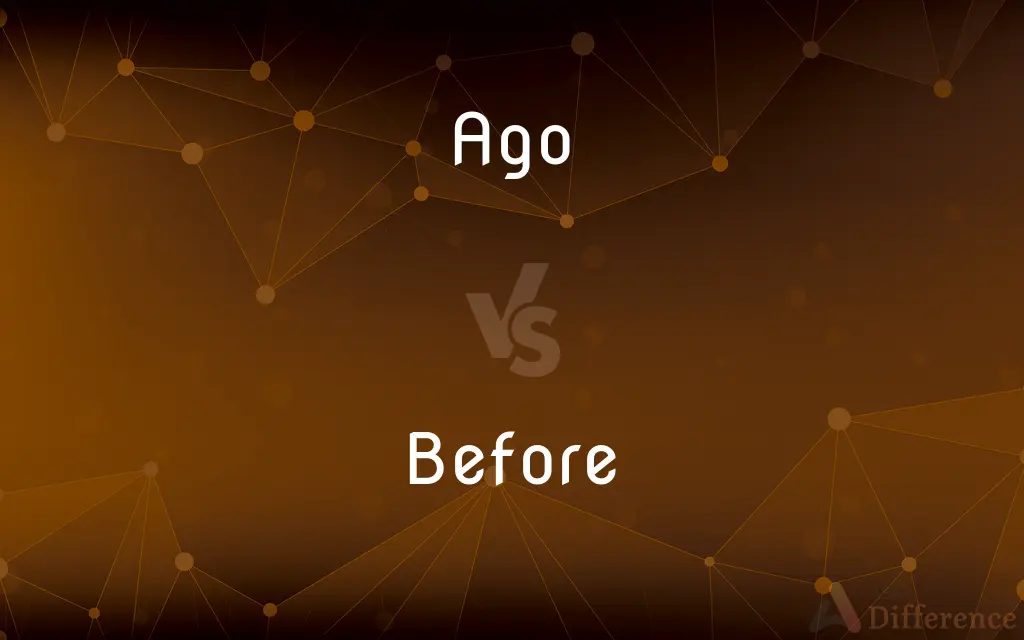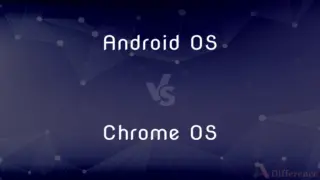Ago vs. Before — What's the Difference?
By Tayyaba Rehman — Published on August 28, 2023
"Ago" refers to a past point from the present, while "before" indicates prior to a specific event or time.

Difference Between Ago and Before
Table of Contents
ADVERTISEMENT
Key Differences
"Ago" and "before" are two temporal terms used to refer to past events, but they serve different grammatical and contextual roles. "Ago" is commonly associated with expressing the time that has elapsed since a certain event. For instance, "I visited London two years ago," means that the event (visiting London) occurred two years in the past from the present moment. On the other hand, "before" can be used more broadly to mean at an earlier time or previous to an event, like "I had been to Paris before I visited London."
Both "ago" and "before" act as markers to give temporal context to a statement. When you hear "ago," you immediately know the reference point is the present. For example, "She graduated college ten years ago." Here, "ago" signals that the graduation took place ten years in the past from the current time. Meanwhile, "before" often requires an additional event or point in time for comparison, such as "She had traveled abroad before she graduated college."
In grammar, "ago" is typically a postpositive adjective, meaning it comes after the time period it modifies: "three days ago." "Before" can function in several ways, including as a preposition ("I will call you before evening"), conjunction ("I left before he arrived"), or adverb ("I have seen this movie before").
While "ago" usually requires a specific time reference to be meaningful, "before" can be used in a more general sense. Saying "I met him ago" would be grammatically incorrect because "ago" needs a specific time frame like "a year ago" or "three days ago." In contrast, "I met him before" is a complete and understandable statement.
Comparison Chart
Grammatical Role
Postpositive adjective
Can function as preposition, conjunction, or adverb
ADVERTISEMENT
Reference Point
Always relates to the present
Relates to a specific event or time
Time Specificity
Requires specific time (e.g., "three days ago")
Can be general (e.g., "I've seen it before")
Usage with Numbers
Common (e.g., "two years ago")
Rare unless referring to sequence (e.g., "before the third day")
Position in Sentence
Comes after the time it modifies
Can come at the beginning, middle, or end of a sentence
Compare with Definitions
Ago
Referring to a point in the past from the present.
I saw him a week ago.
Before
Earlier than a specified time.
I will finish it before evening.
Ago
Used to indicate elapsed time.
She moved here five years ago.
Before
At any time preceding a specific moment.
I've seen him before.
Ago
Postpositive adjective following a duration.
It was built two centuries ago.
Before
In front of, physically or in order.
Stand before the judge.
Ago
Indicating the passage of moments.
The incident happened moments ago.
Before
Prior or preceding in dignity, order, rank, right, or worth; rather than.
He that cometh after me is preferred before me.
The eldest son is before the younger in succession.
Ago
Expressing a past event in relation to the current moment.
The movie started an hour ago.
Before
Earlier; sooner than; until then.
When the butt is out, we will drink water; not a drop before.
Ago
In the past
It happened ages ago.
Before
Rather than; sooner than
I will die before I will betray my country.
Ago
Before
When they first met in 2000, my dad told my mom how he had gotten the money. The story begins 20 years ago.
Before
In the presence of.
He performed before the troops in North Africa.
He spoke before a joint session of Congress.
Ago
Gone by; past
Two years ago.
Before
In front of.
Ago
Gone; gone by; gone away; passed; passed away.
In days ago/in days agone
Before
In advance.
Ago
Nearly gone; dead 19th century]]
Woe the day- she is agone!
Before
At the front end.
Ago
Past; gone by; since; as, ten years ago; gone long ago.
Before
In presence or sight of; face to face with; facing.
Abraham bowed down himself before the people.
Wherewith shall I come before the Lord?
Ago
Gone by; or in the past;
Two years ago
`agone' is an archaic word for `ago'
Before
During the period of time preceding (a particular event or time)
She had to rest before dinner
His playing days had ended six years before
It's never happened to me before
The day before yesterday
They lived rough for four days before they were arrested
Ago
In the past;
Long ago
Sixty years ago my grandfather came to the U.S.
Before
In front of
Matilda stood before her, panting
Trotting through the city with guards running before and behind
Before
In preference to; rather than
They would die before they would cooperate with each other
A skilled warrior who places duty before all else
Before
During the period of time preceding (a particular event or time)
It's never happened to me before
The day before yesterday
She had to rest before dinner
His playing days had ended six years before
They lived rough for four days before they were arrested
Before
In front of
Trotting through the city with guards running before and behind
Matilda stood before her, panting
Before
In preference to; rather than
They would die before they would cooperate with each other
A skilled warrior who places duty before all else
Before
Earlier in time
They called me the day before.
Before
In front; ahead.
Before
Previous to in time; earlier than.
Before
In store for; awaiting
The young man's whole life lies before him.
Before
Into or in the presence of
She asked that the visitor be brought before her.
Before
Under the consideration or jurisdiction of
The case is now before the court.
Before
In advance of the time when
See me before you leave.
Before
Earlier than (in time).
I want this done before Monday.
Before
In front of in space.
He stood before me.
We sat before the fire to warm ourselves.
Before
Under consideration, judgment, authority of (someone).
The case laid before the panel aroused nothing but ridicule.
Before
In front of, according to a formal system of ordering items.
In alphabetical order, "cat" comes before "dog", "canine" before feline".
Before
At a higher or greater position than, in a ranking.
An entrepreneur puts market share and profit before quality, an amateur intrinsic qualities before economical considerations.
Before
At an earlier time.
I've never done this before.
Before
In advance of the time when.
Before
(informal) Rather or sooner than.
I'll die before I'll tell you anything about it.
Before
In front of; preceding in space; ahead of; as, to stand before the fire; before the house.
His angel, who shall goBefore them in a cloud and pillar of fire.
Before
Preceding in time; earlier than; previously to; anterior to the time when; - sometimes with the additional idea of purpose; in order that.
Before Abraham was, I am.
Before this treatise can become of use, two points are necessary.
Before
An advance of; farther onward, in place or time.
The golden age . . . is before us.
Before
Under the cognizance or jurisdiction of.
If a suit be begun before an archdeacon.
Before
Open for; free of access to; in the power of.
The world was all before them where to choose.
Before
On the fore part; in front, or in the direction of the front; - opposed to in the rear.
The battle was before and behind.
Before
In advance.
Before
In time past; previously; already.
You tell me, mother, what I knew before.
Before
Earlier in time; previously;
I had known her before
As I said before
He called me the day before but your call had come even earlier
Her parents had died four years earlier
I mentioned that problem earlier
Before
At or in the front;
I see the lights of a town ahead
The road ahead is foggy
Staring straight ahead
We couldn't see over the heads of the people in front
With the cross of Jesus marching on before
Before
In preference to; rather than
They would die before they would cooperate with each other
A skilled warrior who places duty before all else
Before
During the period of time preceding (a particular event or time)
The day before yesterday
It's never happened to me before
She had to rest before dinner
They lived rough for four days before they were arrested
His playing days had ended six years before
Before
In front of
Trotting through the city with guards running before and behind
Matilda stood before her, panting
Before
In a position superior to
The prince is before his brother in the line of succession.
Before
In store for, in the future of (someone).
Before
In preference or consideration of.
I would choose this before anything else.
Before
In the presence or sight of someone.
She performed her act before a live audience.
Common Curiosities
When do we use "ago" in a sentence?
"Ago" is used to indicate a time interval that has passed since a past event, relative to the present moment.
Is "before" used to describe future events?
Yes, "before" can describe events that will happen prior to a specified future time (e.g., "Finish the task before Monday.")
Does "ago" always need a specific time frame?
Typically, yes. "Ago" requires context like "three hours ago."
Can "before" be used without specifying a time or event?
Yes, "before" can be general, as in "I've met her before."
Can "ago" be used at the beginning of a sentence?
Rarely. "Ago" typically follows the time frame it refers to, like "two days ago."
What's the primary difference between "ago" and "before" in terms of reference point?
"Ago" always relates to the present, while "before" relates to a specific event or time.
How do "ago" and "before" differ grammatically?
"Ago" is usually a postpositive adjective, while "before" can function as a preposition, conjunction, or adverb.
Can "before" stand alone in a sentence?
Yes, it can be used alone, as in "Have we met before?"
Can "before" and "ago" be used interchangeably?
No. Their meanings and usages are distinct.
Is "I met him ago" a correct sentence?
No, "ago" needs a specific time frame, like "I met him a year ago."
Share Your Discovery

Previous Comparison
Deception vs. Deceit
Next Comparison
Coleg vs. CollegeAuthor Spotlight
Written by
Tayyaba RehmanTayyaba Rehman is a distinguished writer, currently serving as a primary contributor to askdifference.com. As a researcher in semantics and etymology, Tayyaba's passion for the complexity of languages and their distinctions has found a perfect home on the platform. Tayyaba delves into the intricacies of language, distinguishing between commonly confused words and phrases, thereby providing clarity for readers worldwide.















































